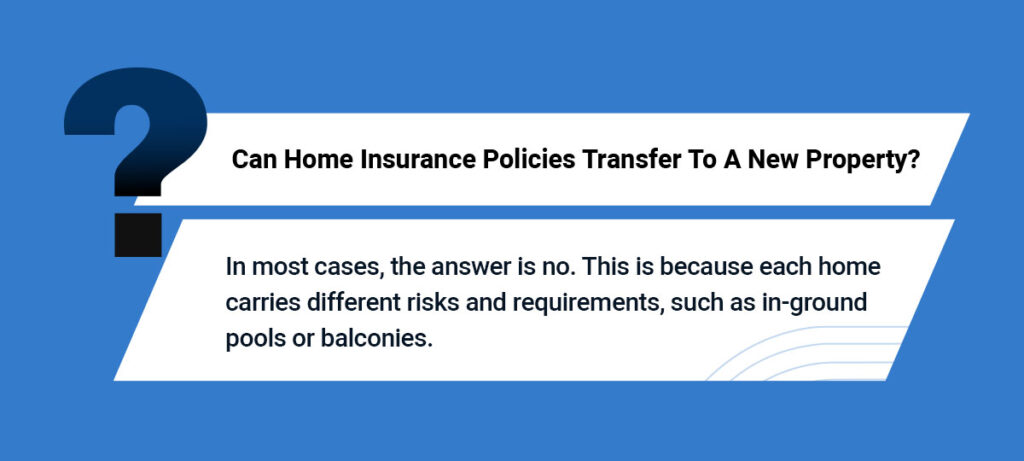
Moving to a new home requires plenty of research and planning. You’ll want to find a safe neighborhood, crunch the numbers to figure out what you can afford and explore your insurance options. You may even need to switch providers if you move to a different state.
Relocating involves more than packing boxes and changing addresses — it also requires a thoughtful review and potential insurance coverage adjustment to ensure your property and assets remain adequately protected in your new living space. This guide explores homeowners insurance options and considerations when moving and critical steps you can take to find an effective policy.
When you sell your house, the old homeowners insurance policy ends, and you are responsible for getting a new one.
Homeowners insurance typically doesn’t transfer because every property poses different risks. Still, you must keep your insurance coverage in place until the moment you sign the deed over. You are liable for any damage or other issues on your old property as long as it still belongs to you.
Read Our Home Insurance GuideThere are several home risks and damages associated with relocating. What if the moving truck gets in an accident that breaks your television, or someone steals your priceless possessions while they are in transit?
Sometimes, your homeowners insurance policy might provide coverage for situations like these. Check your policy terms to see what it covers and whether there are any limitations. When buying insurance for your new home, ask your provider about what they offer to cover damages during a move.
You may also have coverage from the moving company you choose. Federal law requires interstate moving companies to offer two liability options.
In most cases, the answer is no. As we mentioned, this is because each home carries different risks and requirements, such as in-ground pools or balconies.

If you move within the same state, you can get a new policy from your current home insurance provider. Your insurance agent might not have a license to write insurance policies in a different state, so you must find someone else to work with.
Another limitation to note is that you cannot transfer home insurance to the new owner because the policy belongs to you, not the property. Notify your insurance provider of your upcoming move so they can recommend coverage tailored to your new residence or help you find an agent in the state where you’re moving.
Contact Us Today!Here are some steps to ensure a smooth transition into your new home and adequate coverage from the day you move in.
For an out-of-state move, check whether your current home insurance provider offers coverage in your destination. You should then compare your current possessions to your existing policy to decide whether to change it.
Checking if your liability coverage suits your new home can also help you avoid potential risks. Identify coverage gaps, restrictions or special provisions by reading your policy’s fine print.
Once you have scheduled your move, inform your insurance company and ask to update your policy with your future address. If they can cover your new house, provide them with the relevant details, such as the property’s value, location, material, age and safety features. Your insurer will typically tell you what information to provide so they can determine an appropriate premium.
While you may be unable to transfer your exact policy from the previous house, you may transition to a new policy with the same insurance company. Once the insurer presents your options, you can review the terms of each and choose the one that meets your needs best.
If your current insurance provider does not provide coverage in your destination, search for companies that do. You can look online or ask your real estate agent or neighbors. When speaking with different insurers, compare home insurance costs, coverage options, premiums and deductibles. You should also pay close attention to limitations and exclusions to choose a comprehensive policy that protects your property and belongings.
Home and property insurance will not automatically cancel when you move or sell. The insurance company may continue charging premiums if you do not communicate with them about your relocation.
Forgetting to cancel your homeowners insurance when you move can lead to potential complications and unnecessary costs. If you fail to notify your insurance provider and continue to pay premiums for a property you no longer own or live in, this oversight could result in wasted money and a lapse in coverage, leaving you vulnerable to financial risks in the event of property damage or other unforeseen incidents. Proactively update your address and property details with your insurance provider to avoid any unnecessary expenses or gaps in protection.

Transferring your homeowners insurance before your move is essential for the safety of your old and new property and belongings before, during and after.
Does your current insurance provider lack coverage in the area you’re moving to? David Pope Insurance has over 15 years of experience offering home insurance in Missouri, Kansas, Iowa, Colorado, Nebraska, Illinois, Arkansas and Tennessee. As a family-owned insurance agency, we understand the importance of fast and suitable coverage so you and your family feel secure. That’s why we offer flexible options and tell you if something will be cheaper out of pocket. Contact our professionals today to learn more about who we are and what we do.